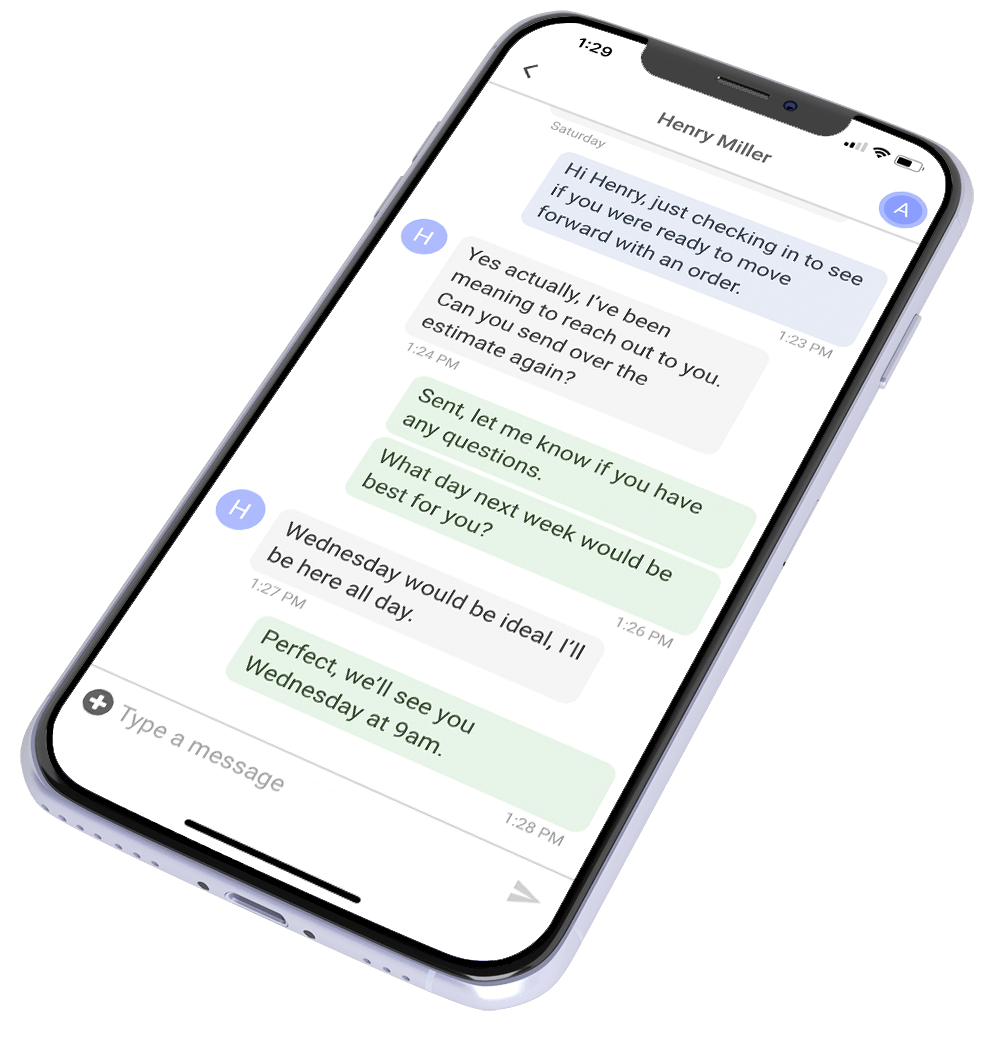
Choosing between an ERP and CRM can transform your roofing business by boosting efficiency, strengthening client relationships, and setting you up for growth.
Roofing companies need tools that save time, reduce hassle, and help close deals faster. The right system should keep schedules, budgets, customers, and teams aligned so owners and managers can focus on running jobs or handling the big picture. When choosing, roofers face one critical question: Do they need a full ERP to handle everything from payroll to inventory, or would a CRM that tracks leads and boosts customer relationships be enough?
This article breaks down each option, making it clear what ERP and CRM systems offer and which solution best solves specific business needs. By the end, you’ll know how these tools fit into a roofing business, whether you’re running a local team or managing multiple crews. These insights can save you time, money, and frustration—and help you get back to building your business.
ERP vs CRM: Choosing the Right Tool for Your Business
Understanding ERP
Enterprise Resource Planning (ERP) acts as the command center for your entire operation. ERP centralizes every part of your business—finances, projects, payroll, inventory, and HR—into one seamless system. Think of it as the control hub where you can track every job, cost, and deadline under one roof.
For roofing companies with complex operations, ERP can be a game-changer. It keeps everything on track, whether you’re coordinating several teams or sites. By consolidating finances, payroll, scheduling, and supply orders, ERP simplifies operations, ensuring nothing slips through the cracks. Instead of juggling multiple apps, ERP brings all the details together, providing a real-time overview of your entire business.
Understanding CRM
Customer Relationship Management (CRM) systems focus on relationships with leads, customers, and prospects. CRMs track, manage, and nurture client interactions, keeping your sales and service on point. For sales-driven roofers, a CRM offers unique advantages. It strengthens client connections by tracking every call, text, and email and keeping detailed records of interactions. CRMs help you convert leads into clients by supporting consistent and effective follow-ups, ensuring no leads fall through the cracks. Automated reminders also keep clients engaged, building loyalty and retention over time.
Deciding Between ERP and CRM
These tools each bring specific strengths to your business so here’s a quick guide to help you decide. Choose ERP if you need an all-in-one system that handles not only customer data but also finances, HR, scheduling, and inventory. ERP’s operational control is ideal for complex businesses that require a streamlined approach to managing multiple moving parts. On the other hand, if your priority is building and managing client relationships, a CRM might be the better choice. With its focus on customer engagement and lead tracking, CRM can drive sales and retention for businesses centered around customer relationships.
And the pros know that you should probably roll with both once you have the money.
Knowing the focus of each system helps you find the right fit, whether that’s ERP’s operational control or CRM’s relationship-building power.
It’s also worth noting that there’s a significant overlap between these two types of tools, especially in roofing. Most CRMs contain some ERP features and vice versa.
Core Benefits of ERP and CRM for Roofing Businesses
ERP Benefits: Efficiency, Control, and Project Tracking
An ERP system keeps every task moving through one centralized platform, from project planning to finances to crew scheduling. Instead of logging into multiple systems, ERP consolidates everything, reducing manual input and errors. This centralized approach not only keeps operations streamlined but also saves time that would otherwise go to managing scattered tasks.
For project tracking and resource management, ERP provides a clear view of each job’s progress, showing inventory levels, crew schedules, and timelines. You know exactly when supplies run low or if a crew needs more support. With real-time alerts for any timeline shifts, ERP helps avoid delays, keeping projects on track and budgets intact.
Financially, ERP provides total control over your cash flow. It lets you manage invoices, set budgets, and monitor profitability per job, instantly identifying if costs start climbing too high. By centralizing financial data, ERP allows better planning and helps keep the business in the green.
CRM Benefits: Building and Retaining Customer Relationships
A CRM system brings all client interactions—calls, texts, emails—into one organized place, creating a digital trail of each customer’s history. With a CRM, you can easily follow up, log updates, and make sure every interaction strengthens client relationships. It turns each point of contact into a chance for improved service and loyalty.
On the sales side, CRM systems excel in timing and precision. By tracking leads and automating follow-ups, CRM keeps leads engaged and helps boost close rates. Automated reminders ensure that each prospect is reached at the right moment, increasing the chances of converting leads into customers and keeping your pipeline warm.
CRM also shines in customer retention. By storing detailed client records, a CRM helps you provide personalized service, which clients remember and appreciate. This personal touch keeps clients coming back and drives referrals—a crucial edge in an industry built on trust and word-of-mouth.
In businesses that depend on repeat clients and referrals, both ERP and CRM can play powerful roles. Next, let’s explore what it takes to bring each system on board.
Cost and Complexity: What’s the Investment?
ERP Systems: Investment, Training, and Scalability
ERP systems come with a price tag, and there’s a reason for it. These systems cover everything from payroll to project management, often requiring licensing fees, setup charges, and training sessions to get your team fully onboard. For larger roofing companies, this initial investment pays off in streamlined operations and centralized control.
However, ERPs require training and time to master. With their many features and deep integrations, ERPs don’t simply “plug and play.” Teams need onboarding, technical support, and a clear roadmap to maximize ERP’s potential. Once in place, though, an ERP can handle complex operations smoothly, making it an ideal choice for roofing businesses with multiple crews, sites, or heavy workloads. For companies looking to grow and scale, the commitment of time and money often justifies itself through improved efficiency and control.
CRM Systems: Cost, Ease of Use, and Fit for Smaller Teams
CRMs tend to be budget-friendly, with clear, per-user or monthly pricing that makes financial planning straightforward. Unlike ERP systems, CRMs avoid large upfront costs, making them affordable for smaller teams focused on managing client relationships and tracking leads.
CRMs are also easier to set up and require minimal training. Most are intuitive, letting teams jump in quickly to start managing leads and following up with customers. CRMs are built for roofers who want fast, effective results without the need for complex systems. This makes them an ideal fit for small to mid-sized businesses focused on sales and customer engagement rather than comprehensive operational oversight.
Choosing the Right Tool for Your Needs
Selecting the right system means weighing initial costs and the learning curve against the specific needs of your business. For companies needing extensive operational control, ERP’s investment can lead to streamlined growth. Meanwhile, CRMs offer a simpler, cost-effective option for those looking to boost sales and manage client relationships without a heavy upfront commitment.
Integration with Existing Tools and Processes
ERP Integration: Comprehensive but Complex
An ERP links all parts of your business—accounting, inventory, HR, and even roofing-specific tools—into one system. This integration centralizes everything, from payroll to project management, giving you a full view of your operations without bouncing between apps.
However, ERPs don’t always come ready to use out of the box. They may require IT support to set up and customize, which can mean added costs for small businesses. While ERPs are built to handle complex integrations, they can sometimes add extra layers of setup and support to get everything working seamlessly.
CRM Integration: Simple, Fast, and Flexible
CRMs are designed to connect easily with other tools, from lead generation and email marketing to sales platforms. This flexibility allows CRMs to sync quickly with your current systems, letting you focus on what matters—engaging leads and building customer relationships.
CRMs also simplify automation, handling follow-ups, reminders, and emails without the need for IT intervention. By automating repetitive tasks, a CRM frees up your team to focus on closing deals and strengthening client connections.
Choosing the Right System for Your Setup
Assess your current tools to find the best fit. If your setup is simple and customer-centered, a CRM can integrate easily and deliver quick results. But if you’re managing inventory, payroll, and supply chains in addition to sales, an ERP might be better equipped to support your needs.
For example, if you’re already using tools like AccuLynx or SumoQuote, consider which system will connect seamlessly. A CRM might give you just the right level of integration, while an ERP could provide more features than you need. Ultimately, the choice depends on the tools you rely on today and where you want your business to grow.
Scalability and Long-Term Fit: Which System Grows with Your Business?
ERP Systems: Ready for Large Scale and Complexity
ERP systems are built to scale as your business expands, handling the complexity of managing multiple locations, large projects, and diverse teams. For roofing businesses planning regional or multi-state growth, an ERP provides the structured framework needed to support new layers of operation.
However, this scalability comes with a tradeoff. For smaller businesses managing only a few crews or focusing on local jobs, ERP may feel excessive—like using a bulldozer to plant a flower. ERPs work best for larger operations that need extensive oversight, not for lean teams looking to keep it simple.
CRM Systems: Flexible and Focused on Customer Growth
CRMs are also scalable but in a way that supports customer-driven growth. As your client list expands, a CRM keeps up with your outreach, allowing you to track more leads, add sales reps, and stay connected to an ever-growing network. It scales with your customer interactions, without adding operational weight, making it ideal for businesses focused on growing client relationships rather than internal complexity.
For smaller or growing roofing businesses, CRMs offer the right balance of simplicity and scalability. They let you start small but keep the door open for growth, helping you manage a rising volume of leads without the heavy overhead.
Key Considerations for Choosing Based on Growth
Think about your long-term goals. Are you scaling operations by adding new projects, crews, or locations? An ERP could better support those expansions by centralizing control. On the other hand, if your focus is on customer outreach and lead management, a CRM can be the smarter choice. It can provide what you need without overwhelming your processes.
Consider this scenario: Starting with a CRM allows you to handle leads and track jobs efficiently as you grow. But when your business reaches a size where you’re managing multiple teams, schedules, and budgets, adding an ERP into the mix can make sense. This approach lets you scale gradually, using the right tools at each stage without overspending or missing essential features.
Again, the pros know that you can use both. In fact, it’s all too common for roofers to try forcing their CRM to work like an ERP. Instead, get a dedicated ERP that integrates with your CRM!
Conclusion: Choosing the Right System for Your Roofing Business
Choosing between an ERP and a CRM comes down to this: What does your business need most right now? If you’re focused on connecting with leads, automating follow-ups, and strengthening client relationships, a CRM will help you reach those goals quickly. But if your operation requires managing every moving part—from finances to team schedules—an ERP offers the control and insight needed to scale.
Unlike other choices, you can also have your cake and eat it, too. Just make sure your CRM and ERP can integrate.
The right choice isn’t about which system looks better on paper; it’s about the best fit for your business. For many roofers, starting with a CRM is a smart way to build manageable sales and service processes. When complexity increases, an ERP can step in to keep everything aligned. Don’t let tech hold you back—use it to your advantage. Choose the system that meets your needs today and sets you up for tomorrow’s growth.
Ready to take the next step? Invest in a tool that works for your business, your goals, and your team. You’ll save time, avoid unnecessary headaches, and stay focused on what matters most: building a business that thrives.
Want a quick look at how ProLine can help? Check out our overview video to see how ProLine’s CRM powers up your roofing business.
Ready to see ProLine in action? Book a demo and find out how our tools can help you close more roofing jobs with less hassle.
Not sure which CRM is best for you? Take a look at our guide to the 8 best roofing CRMs to compare top tools and find your perfect fit.



